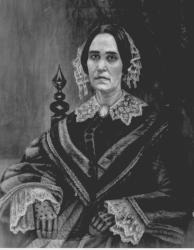
Born in Abbeville, South Carolina, December 18, 1805, Julia Tarrant's family was part of the rush of white settlers to claim the land of the Alabama Territory. The Tarrants settled in the Elyton area of Jefferson County, where Julia married William C. Barron, also a native of South Carolina. He was a prosperous merchant and planter who opened one of the first stores in Marion, Alabama, in 1820. William died in 1832, and the widowed Julia took over his business and land interests. Until the end of her life, Barron freely contributed much of her wealth and service toward the establishment of educational and religious institutions in Marion.
A member of Siloam Baptist Church, Barron gave the congregation a parcel of land, upon which the first of Siloam's church buildings was constructed.
She invited a group of civic and educational leaders to her home for a consqeuential meeting which resulted in the 1838 establishment of the Judson College, the fifth-oldest women's college in the United States. Her only son, John Thomas, was one of the first nine "young ladies" in Judson's first class. Since he and Judson soon outgrew his attendance there, Julia was instrumental in beginning Howard College, which relocated from Marion and is now Samford University. Barron, in cooperation with the Baptist leaders who founded Judson, again provided funds to start the new college. John Thomas Barron would be the first collegiate graduate of Howard College in 1846.
Barron, along with Siloam pastor James Devotie and Judson president Milo P. Jewett, began The Alabama Baptist, a newspaper for Alabama Baptists, in Marion.
With the decline of the planter economy following the Civil War, Barron's fortune was lost. In an account of the laying of the cornerstone for new Jewett Hall at Judson College in 1889, Barron was described as a "white-winged messenger who blessed the school with her prayers, tears, time, and ample means."
Julia Barron's death on February 5, 1890, brought a flurry of obituary editorials. One of them said, "Hers was a useful life, and her noble deeds will continue to live in the memory of thousands of Christian people."
Her former pastor, William H. McIntosh, wrote, "It may truthfully be said of her that her purse was the Lord's, and she held all that she possessed in trust." McIntosh had once asked her, after she was reduced to poverty, how she felt about all the money she had given away.
She replied, "I only wish I had more to give."
![]() Other Inductees
Other Inductees
![]() Alabama Women's Hall of Fame
Alabama Women's Hall of Fame